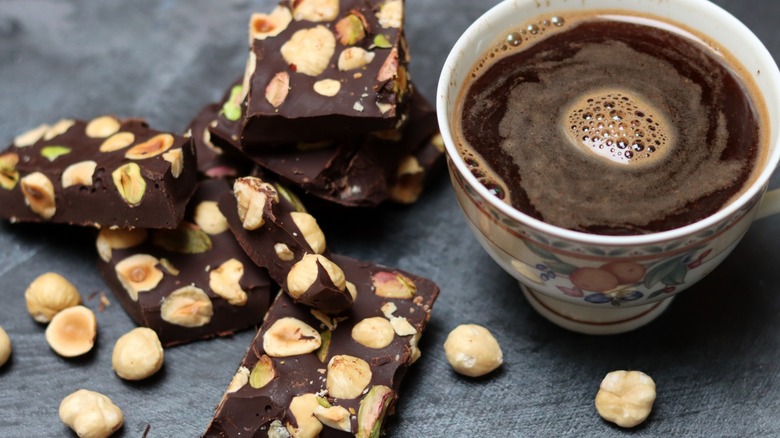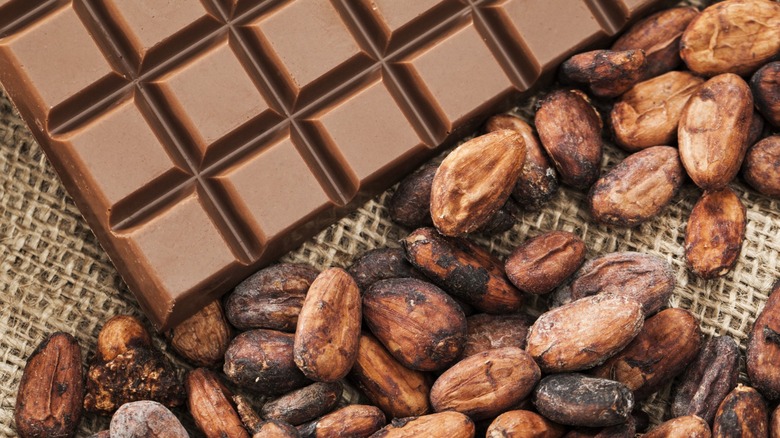Just How Much Caffeine Is In Dark Chocolate Vs A Cup Of Coffee?
We may receive a commission on purchases made from links.
For many people, the day really can't begin until they've downed their first cup of java in the morning. Maybe you need a second cup before the caffeine kicks in, but like reliable Old Faithful, you'll soon feel the jolt that gets you through the early hours and keeps you buzzing as you go on your merry way. Then, once your caffeine high inevitably winds down in the afternoon, you might chomp on one of the best grocery store dark chocolate bars for a little energy pick-me-up.
Chocolate's caffeine comes from the cocoa solids that are extracted from fermented and roasted cacao beans. During the chocolate-making process, cocoa butter (also extracted from the cacao bean) and sugar are added to the cocoa solids, and as a general rule, chocolate with a higher percentage of cocoa solids and less sugar will have the most caffeine. For example, dark chocolate with 70% to 85% cocoa solids can have 22.7 milligrams of caffeine per ounce, while milk chocolate has less solids and much less caffeine, about 5 to 9 milligrams per ounce.
There's no caffeine in a white chocolate bar, like this white Toblerone bar on Amazon, because it has no cocoa solids. Many dark chocolate bars, such as this Ghirardelli Intense Dark Chocolate Bar on Amazon, weigh 3.5 ounces, which calculates to a little more than 79 milligrams of caffeine. Meanwhile, the amount of caffeine in a 12-ounce brewed coffee can vary between 113 milligrams and 247 milligrams of caffeine. So, in comparison, a 12-ounce portion of dark chocolate has more caffeine at approximately 272 milligrams — but you'd have to eat a lot of chocolate (around 8 ounces) to get it.
Dark chocolate can be healthier than coffee
You can get your daily dose of caffeine from everything from the most popular coffee brands to soft drinks (we ranked the caffeine content of 24 of the most popular sodas), and, spoiler alert, even decaf coffee isn't completely decaffeinated. According to the U.S. Food and Drug Administration (FDA), consuming some caffeine daily is safe for most people — excluding pregnant women, breast-feeding mothers, and those with certain health conditions — and two to three 12-ounce cups of coffee per day (400 milligrams of caffeine in total) shouldn't have serious side effects.
However, you can go overboard on your caffeine intake, especially if you gulp down a daily energy drink, and you may start noticing the jitters, increased anxiety, stomach issues, and a dangerously rapid heart beat. The caffeine in dark chocolate, though, has a different chemical composition, and you don't experience the same adverse side effects. Both cacao and coffee beans contain flavonoids, which have anti-inflammatory and antioxidant properties that are beneficial to heart health and blood pressure. Dark chocolate, however, has a higher level of flavonoids than coffee, and some medical experts recommend eating a 1-ounce square per day.
But as tempting as devouring an entire Belgian chocolate bar (like this one by Tony's Chocolonely on Amazon) may be, it's best to parcel out its calories and fat content to bite-size pieces. However, you don't need to limit your daily dark chocolate intake to a bar; dark chocolate-covered strawberries are a delectable alternative. While the darkest chocolate is a healthy choice, it's the opposite with coffee: Light roast coffee, like this Sun Catcher by Peet's Coffee available on Amazon, actually has more caffeine and flavonoids than dark roast coffee. And if you need a major pick-me-up, check out the 20 Starbucks drinks with the most caffeine.

